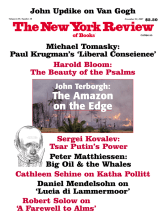In response to:
Shall We Dance? from the September 27, 2007 issue
To the Editors:
I have the greatest respect for William H. McNeill, so I was saddened as well as dismayed by the lapses evident in his review of my book Dancing in the Streets: A History of Collective Joy [NYR, September 27]. To give two examples:
He writes that “her claim that ancient ‘temperament’ (whatever that means) was characterized by polar opposition between a ‘feminine, or androgynous, spirit of playfulness’ associated with Dionysus and Yahweh’s ‘cold principle of patriarchal authority’ is plainly wrong.” In fact, I make no such claim. In the paragraph in my book that McNeill quotes from, this view is clearly attributed to Joseph Campbell and Robert Graves.
He also accuses me of Eurocentrism. Well, mine is not a survey of festivities and ecstatic rituals throughout the world. It is the story of their suppression, first within Europe, and then by European colonizers fanning out around the globe. Perhaps McNeill missed the following sentences, which begin a chapter called “Guns Against Drums: Imperialism Encounters Ecstasy”:
The reader might justifiably accuse me of eurocentrism in my emphasis, so far, on European developments—except for one thing: It was the Europeans—not the Chinese or Aztecs or Zulu—who forcibly imposed their culture and beliefs on people throughout the world.
Barbara Ehrenreich
Alexandria, Virginia
William H. McNeill replies:
I was wrong to use the word “claim” in the excerpt of my review that Barbara Ehrenreich complains of, since she merely says, “It is tempting to divide the ancient temperament into a realm of Dionysos and a realm of Yahweh,” and attributes the view to Robert Graves, Joseph Campbell, and “many since them” without explicitly joining their ranks. But she appears to take the polarity for granted until “this entire dichotomy breaks down with the arrival of Jesus.” She may have reservations about accepting the view I attributed to her, but did not make them explicit.
As for Eurocentrism: I did not use that term when pointing out how much of the history of ecstasy she leaves out, and did take note of her discussion of the “nineteenth-century collision of European imperialists with native ecstatic practices around the globe.”
This Issue
November 22, 2007



